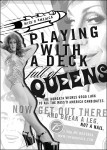Take this Englishman.
While you’re at it, do him a favor and find a cricket bat to beat a sense of self-awareness into him with. His name is John Barr, and he’s the head salesman for a Toyota dealership in Las Vegas.
Every city, of course, has at least one – the flamboyant auto pimp who apparently believes that no one ever buys a car because it’s powerful, or durable, or stylish, or economical. People buy only because the guy who represents the public face of the dealership has such a wacky and irresistible personality. It’s no great revelation that auto salespeople with egos this size are all but indistinguishable in their volume and obnoxiousness. There’s almost certainly a Barr equivalent in Des Moines, another one in Raleigh-Durham, and yet another in Amarillo.
Barr’s TV spots feature him acting the buffoon, either getting tackled by college football players, being shot out of a cannon…you get the idea. Emblematic of yet another thing that’s wrong with the advertising industry, Barr is that worst of narcissists – not only has he been blessed with an oversized ego, he’s got access to the vehicle with which to let that ego manifest itself and grow ever larger.
Decency prevents the posting of a Barr spot here. Search his name together with his dealership name on YouTube if you want to see the kind of work that will never, ever leave McFarlane Media’s doors. (At least not with our name on it. A paycheck is a paycheck.)
When criticized about the inanity and forced humor of his spots, which happens daily if there’s a God, Barr has a ready-made comeback he foists on the unsuspecting viewer who dares to call into question his tastelessness and silliness. According to a story on Barr in the Las Vegas Review-Journal, while you might find his spots annoying and patronizing, the star counters with the following irrefutable logic: “But you remember them.” Well. There’s a legitimate appeal to reason and judiciousness, shot down like a clay target with four pithy words.
Here are some other phenomena that people who witnessed them will likely never forget:
The Holocaust
The Rwandan Genocide
D-Day
The Rape of Nanking
The Great Sumatra-Andaman Earthquake
The 2008 Detroit Lions.
Imprinting itself on the public’s consciousness, however indelibly, does not a great spot make. It’s the lowest imaginable standard for resonation. Barr’s series of “Bitty-Barr” spots (a ripoff of Verne Troyer’s “Mini-Me” character) might last longer in the viewers’ collective medulla oblongata than does a rival dealer’s spot whose most arresting visual feature is a graphic reading “0.9% financing or $2500 cash back.” That’s not the point. Being memorable is never enough, and the desire to be memorable is not just egotistical, it’s counterproductive.
Carrying the virtues of volume and impudence to their logical extension, if you want to create a memorable spot, why not just drop trou and defecate on a painting of the Virgin Mary? Sure, it’ll offend countless people. But depending on how sleepy the town is, such a campaign could result in the advertising becoming the lead story on the local evening news. It’d be certain to get the community talking and create hogsheads of publicity. (To anyone still naïve enough to believe the canard that there’s no such thing as bad press, go ask Captain Joe Hazelwood. Or Michael Richards. Or every cigarette manufacturer in America. Consumers are more jaded than they used to be, which is welcome. They’re also more sensitive than they used to be, which is not.)
Wait – there remains that pesky matter of a product that needs to be sold. Maybe, just maybe, there’s more to the game than just getting attention. A McFarlane Media staffer used to work at an all-sports radio station. The hack afternoon host would routinely start his show by introducing an audacious proposition – e.g., the NFL should go to 7-man football, opening the game up and encouraging more scoring. The phone lines would then light up with callers ready to tell the host how idiotic he was, much to his delight. As far as the host was concerned, it didn’t matter what the callers had to say as long as they were calling. Busy phone lines were the undeniable signs of an edgy radio show. But not a successful radio show. Never mind that for every caller, there were probably 50 other listeners who expressed their displeasure not by calling, but merely by changing the station, sticking candle wax in their ears, or deciding to never patronize the show’s sponsors.
Yes, a message needs form to attract passersby and the curious. To get people to part with their money, it also needs a little feature called “content”. Sometimes, it’s not how you say it, it’s what you say.




